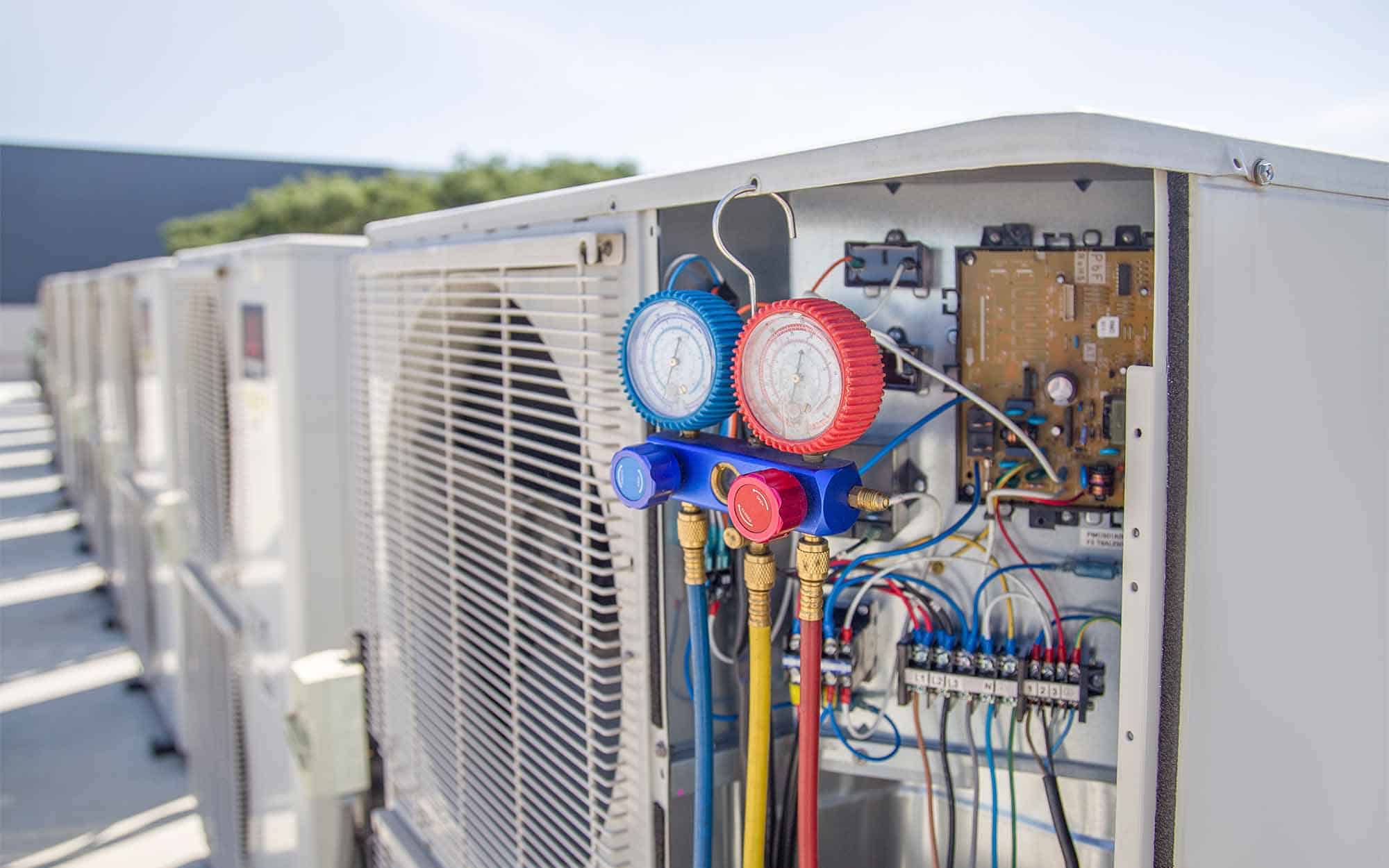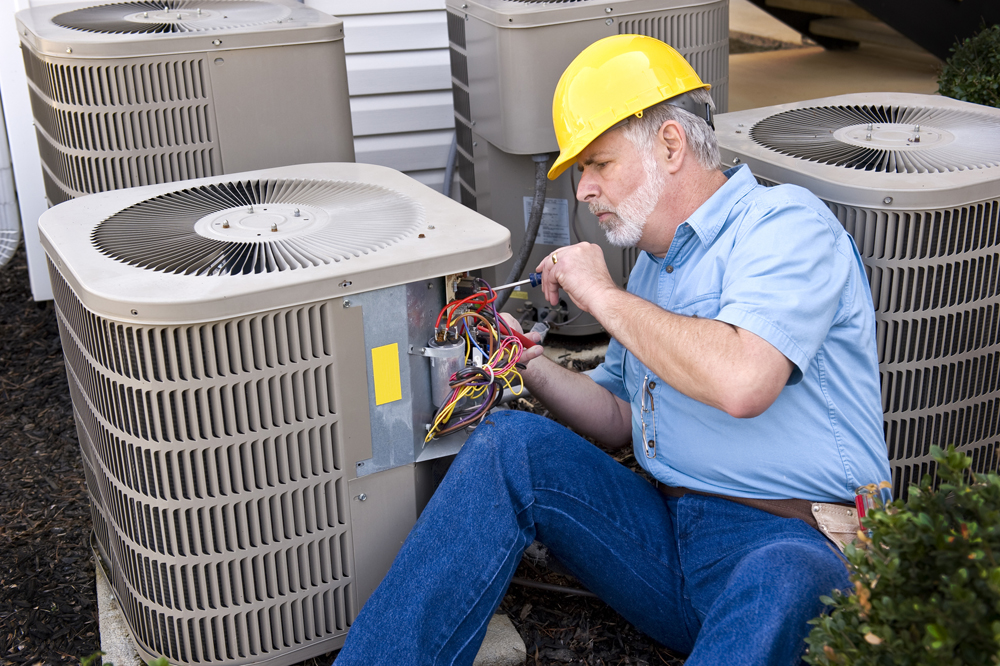When and Why to Schedule heat pump replacement ooltewah tn
Selecting In Between a Heatpump and Heating System: Key Factors To Consider for Your HVAC Demands
When assessing heating choices for cooling and heating requires, the choice in between a heatpump and a furnace can be complex. Each system provides unique benefits customized to certain environments and power performance goals. Understanding these distinctions is important for making an informed choice. Key factors such as setup expenses and ecological effect further make complex the option process. Which choice absolutely aligns with one's convenience and sustainability choices? The adhering to sections will check out these factors to consider in information.
Comprehending Heat Pumps: Just How They Function and Their Benefits
While many property owners think about different heating options, comprehending exactly how heatpump function and their advantages can greatly affect their decision. Warmth pumps operate by transferring warm as opposed to producing it. In the wintertime, they extract warm from the outdoors air or ground and move it inside, while in the summertime, they reverse this procedure, cooling the home by expelling warm outside. This twin capability makes them functional for year-round climate control.One of the primary benefits of warmth pumps is their energy performance. They use substantially less power compared to typical heating systems, possibly leading to lower utility expenses (heat pump service). In addition, heat pumps have a smaller carbon impact, making them an eco-friendly option. They likewise call for less upkeep than standard systems, adding to lasting price savings. In general, recognizing the technicians and advantages of heatpump can assist homeowners make notified decisions concerning their heating and cooling needs
Exploring Heaters: Kinds, Procedure, and Benefits
Heaters can be found in various types, including gas, electric, and oil designs, each with distinctive operational devices. Recognizing these distinctions is important, as they influence effectiveness and home heating performance. Furthermore, heating systems provide many advantages, such as constant heat result and dependability in chillier environments.
Sorts of Heating systems
Heating systems can vary substantially in layout and procedure, with heaters being a popular selection among property owners. There are a number of types of heating systems, each making use of different gas sources and innovations. Gas heaters prevail, leveraging gas to produce warm efficiently. Electric heating systems, on the various other hand, use electrical resistance to produce warmth, frequently favored for their straightforward setup. Oil furnaces, while less common, work in locations with limited gas accessibility (furnace replacement). Furthermore, condensing heaters make best use of energy efficiency by recycling and capturing exhaust gases. Each type operates via a system of warmth exchangers and ductwork to disperse cozy air throughout a home. Recognizing the differences in between these heating system types is essential for educated heating and cooling choices
Benefits of Heating systems
For homeowners looking for dependable heat throughout chilly months, the advantages of heaters are significant. Heating systems provide constant home heating, making sure also temperatures throughout the home. They are especially reliable in severe cool, often outshining heatpump in cold conditions. Various types, consisting of gas, electrical, and oil heating systems, offer flexibility to meet diverse requirements and preferences.Furnaces also have a tendency to have reduced preliminary installment prices compared to warmth pumps, making them a much more obtainable alternative for many. Their durable design adds to a much longer life expectancy, with lots of devices lasting over 15 years with correct upkeep. Additionally, modern heaters are often equipped with sophisticated technology for enhanced effectiveness, which can bring about reduced power costs. Generally, heaters continue to be a trustworthy option for reliable home heating.

Power Efficiency: Comparing Warmth Pumps and Furnaces
When comparing energy efficiency between warm pumps and heating systems, the Seasonal Power Efficiency Ratio (SEER) plays an important duty in establishing efficiency. In addition, an operational cost evaluation reveals the long-lasting financial implications of each system. Comprehending these elements can lead house owners in making notified choices regarding their home heating solutions.
Seasonal Energy Performance Proportion
Power effectiveness plays a necessary role in the decision-making process in between heatpump and heaters, especially when taking into consideration the Seasonal Energy Efficiency Proportion (SEER) This metric procedures the cooling efficiency of warmth pumps over a whole cooling season, supplying a standardized method to review efficiency. Higher SEER rankings show higher energy effectiveness, translating to lower energy usage and lowered utility bills. In comparison, heaters are typically analyzed making use of the Annual Fuel Use Performance (AFUE) rating, which mirrors home heating efficiency. When contrasting these two systems, property owners should focus on SEER scores for heatpump, as they directly influence general power cost savings and ecological sustainability. A detailed understanding of SEER can significantly affect the long-term fulfillment and cost-effectiveness of the picked HVAC option.
Functional Expense Evaluation
Comprehending the operational prices connected with heatpump and heaters is vital for house owners examining their alternatives. Heatpump normally supply greater energy efficiency, transforming electric energy into heat with marginal waste. This leads to lower monthly energy costs, particularly in moderate environments. On the other hand, traditional heaters, specifically gas models, may have lower upfront prices but can incur higher functional expenses with time because of sustain rates and effectiveness ratings.Moreover, heat pumps can function as both heating and click this site cooling down systems, potentially reducing the requirement for different HVAC units. While preliminary financial investments for heatpump may be higher, their long-term cost savings in power effectiveness can make them a more cost-efficient choice for numerous households. Careful evaluation of local energy rates is necessary to establish the most effective alternative.
Setup Expenses: What to Expect for Each Heating System
Installment expenses for heater can differ considerably between warm pumps and furnaces, affecting homeowners' choices. Warm pumps usually have greater ahead of time installment prices, normally varying from $3,500 to $8,000, depending on the unit dimension and intricacy of installation. This includes the exterior unit, interior handling system, and required ductwork modifications. On the other hand, heating systems tend to have lower initial costs, averaging in between $2,500 and $6,000, which can be appealing for budget-conscious property owners. Nevertheless, installation expenditures can raise if comprehensive ductwork is required.Moreover, the selection of gas type for furnaces-- gas, lp, or electrical-- can also influence installation prices. While heatpump supply power effectiveness, their preliminary investment might deter some customers. Inevitably, examining setup costs along with long-lasting financial savings and efficiency will certainly assist property owners in making notified choices regarding their heating unit.
Climate Factors To Consider: Which System Does Better in Your Location
Exactly how do climate conditions affect the performance of heating unit? The efficiency of heatpump and heaters can vary considerably depending upon the local environment. In modest climates, heatpump stand out by efficiently moving heat from the outdoors air, making them an energy-saving option. Their effectiveness diminishes in incredibly chilly temperatures, where they may battle to draw out adequate heat. Conversely, heating systems, especially gas versions, give dependable and regular warm regardless of outside problems, making them preferable in cooler regions.In areas that experience milder winter seasons, warm pumps can run properly year-round, giving both heating & cooling. In contrast, areas with extreme winter seasons often profit from the effectiveness of heating systems. Inevitably, understanding the regional environment is essential when choosing between a heat pump and a furnace, as it directly influences their operational effectiveness and general performance.
Upkeep Requirements: Long-Term Treatment for Heat Pumps vs. Furnaces
While both warm pumps and furnaces need normal maintenance to guarantee peak performance, their specific demands and treatment routines vary substantially. Heaters usually require much less frequent attention, with yearly examinations sufficing to look for gas leakages, tidy filters, and evaluate total functionality. Their easier style frequently allows for straightforward repairs.In comparison, warm pumps demand semiannual upkeep because of their twin role in heating & cooling. This includes cleansing coils, checking cooling agent levels, and ensuring that both the indoor and outdoor systems function at their best. Furthermore, heatpump upkeep usually involves more intricate components, making specialist maintenance essential.Neglecting maintenance can lead to lessened performance and increased power expenses for both systems. Ultimately, home owners should consider these lasting treatment requirements when selecting between a heatpump and a heater, as aggressive upkeep can expand the life-span and performance of either system significantly.
Ecological Influence: Selecting a Lasting Home Heating Alternative
The environmental effect of furnace is an important examination for house owners looking for sustainable options. Heatpump are normally extra energy-efficient than conventional heating systems, as they move heat as opposed to create it, considerably minimizing carbon emissions. By making use of renewable resource resources, such as air-source or geothermal heatpump, home owners can additionally reduce their eco-friendly footprint.On the other hand, gas heating systems send out greenhouse gases and add to air pollution, though they frequently offer higher heat outcome. Advancements in modern technology have led to the development of high-efficiency heaters that decrease emissions.Ultimately, selecting a heating this page system includes evaluating performance versus environmental impact. House owners are encouraged to review neighborhood energy sources and incentives for eco-friendly systems, making sure an option that aligns with both personal comfort and ecological responsibility. The decision affects not only prompt convenience however also lasting sustainability and ecological health.
Often Asked Inquiries
How Much Time Do Heat Pumps and Furnaces Commonly Last?
The life expectancy of heatpump normally ranges from 15 to 20 years, while furnaces can last in between 15 to three decades. Routine upkeep considerably influences their long life and effectiveness in providing home heating navigate to this website services.
Can I Use a Heatpump in Extremely Cold Climates?
Heatpump can run in very cool environments, but their efficiency diminishes as temperatures decline. In such problems, supplementary home heating sources may be required to maintain comfortable indoor temperatures and guarantee peak efficiency.

What Is the Sound Level of Warmth Pumps Versus Furnaces?
The noise degrees of heatpump and heaters vary significantly. Typically, heatpump operate even more quietly than conventional heaters, making them preferable for those conscious appear, while furnaces might create louder functional noises during heating cycles.
Are Warm Pumps Suitable for Both Heating & Cooling?
Heatpump are undoubtedly ideal for both cooling and heating (ductless mini splits). They work by moving warmth, offering reliable temperature control year-round, making them a versatile choice for house owners looking for an all-in-one cooling and heating solution
What Dimension Home Heating System Do I Need for My Home?
Determining the suitable size heating system for a home needs examining aspects such as square video, insulation quality, neighborhood climate, and the home's layout. Consulting a professional can ensure an accurate analysis and suitable convenience. Warmth pumps normally use greater energy performance, converting electric energy into warm with marginal waste. In modest environments, warm pumps excel by efficiently moving warm from the outdoors air, making them an energy-saving option. Alternatively, heating systems, especially gas designs, offer constant and reliable heat regardless of outside problems, making them more suitable in chillier regions.In areas that experience milder winters, warmth pumps can run efficiently year-round, giving both heating and cooling. Heat pumps are usually much more energy-efficient than traditional heating systems, as they move heat instead than generate it, considerably minimizing carbon emissions. By using eco-friendly power resources, such as geothermal or air-source heat pumps, property owners can even more minimize their eco-friendly footprint.On the various other hand, natural gas heating systems emit greenhouse gases and add to air contamination, though they commonly supply greater heat output.